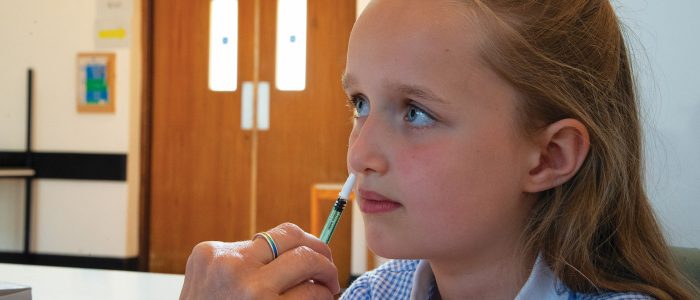Parents encouraged to get primary and secondary school children vaccinated against flu
NHS Forth Valley is encouraging parents to ensure that the flu vaccine consent forms being distributed through primary and secondary schools are completed and returned on time to protect their children, family and friends from flu this winter.
Secondary school pupils will join all primary school children in Scotland in being eligible for this year’s flu vaccine, given as a painless nasal spray at school. Consent packs containing a letter, leaflet and consent form will be sent home to parents and carers of primary school children, and consent forms must be returned within seven days.
Secondary school pupils will also receive a consent pack, with letter, leaflet and consent form for their parent/carers. They will also receive a digital leaflet with information, which will be emailed from school, or they can request paper copies at school. Consent forms must be returned within seven days and secondary pupils can self-consent, though they are encouraged to speak to a parent or carer first.
More people than ever are being offered the flu vaccine this year as it is the safest, most effective way for people to protect themselves against flu.
Fiona Coan, NHS Forth Valley’s Immunisation Team Manager, said: “Flu is serious and can result in even healthy children and teenagers ending up in hospital. This winter, our immunity may be lower than usual due to lower levels of the flu virus circulating last year while the crucial public health measures were in place. Getting the flu vaccine nasal spray is the best way to protect your child and those around them and will help prevent the flu virus putting extra strain on NHS Forth Valley’s services this winter.
“It’s more crucial than ever that as many eligible people as possible get vaccinated against flu, so please ensure that your child’s completed consent form is returned on time if you wish them to receive the vaccine. If you have any questions or concerns about the vaccine, you can visit www.nhsinform.scot or speak to a health or immunisation team, practice nurse, or GP.”
Health Secretary Humza Yousaf said: “Flu can be extremely serious and is very infectious. With COVID-19 still circulating in the community we can best protect the people of Scotland by encouraging everyone eligible to get vaccinated against flu too.
“That’s why this flu season, we are extending the vaccination programme and offering the flu vaccine to around four million people in Scotland, including all primary and secondary school children. This will help to protect those most at risk as well as ease pressure on our National Health Service and social care services. The vaccines are safe and the best way to help protect you, and others, from flu this winter.”
The flu vaccine will be given in schools between September and December 2021. The flu virus changes every year, so you need to get the vaccine every year to stay protected. The flu vaccine cannot give you flu, but it can stop you catching it. The COVID-19 vaccine does not offer any protection from flu, you need to get the separate flu vaccine.
In a small number of cases, the nasal spray may not be suitable, and the vaccine can be given as an injection in the arm instead. For more information about the flu vaccine, visit www.nhsinform.scot/childflu, call 0800 030 8013, or speak to a health or immunisation team, practice nurse, or GP.
This year, the following groups are eligible for the flu vaccine:
- all those aged 50 years of age and over
- those over 6 months of age with a medical condition which puts them in an ‘at risk’ group such as asthma, diabetes, cystic fibrosis, multiple sclerosis, heart and lung diseases, or autoimmune disorders.
- healthcare workers
- social care workers who deliver direct personal care
- unpaid and young carers
- pregnant women (including those with at risk conditions)
- children aged 2-5 years old (not yet at school)
- primary school children
- secondary school pupils
- NHS independent contractors including GP, dental and optometry practices, community pharmacists and laboratory staff working on COVID-19 testing
- teachers, nursery teachers and support staff in close contact with pupils (in both a local authority and independent setting)
- prison staff and support staff in close contact with the prison population (delivering direct detention services)





